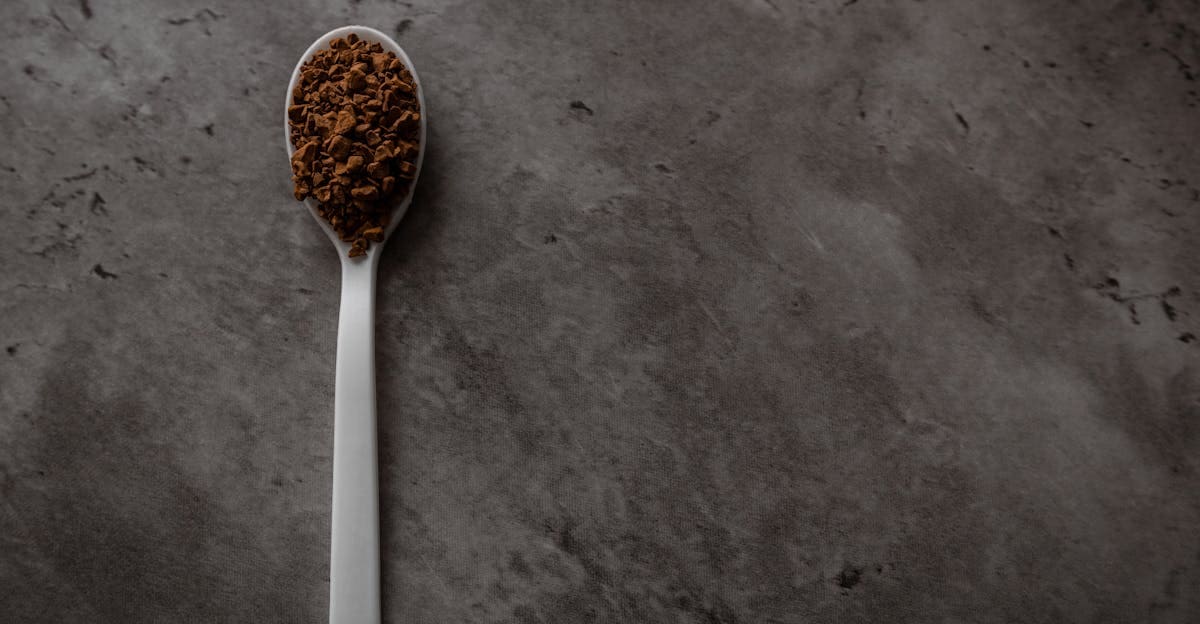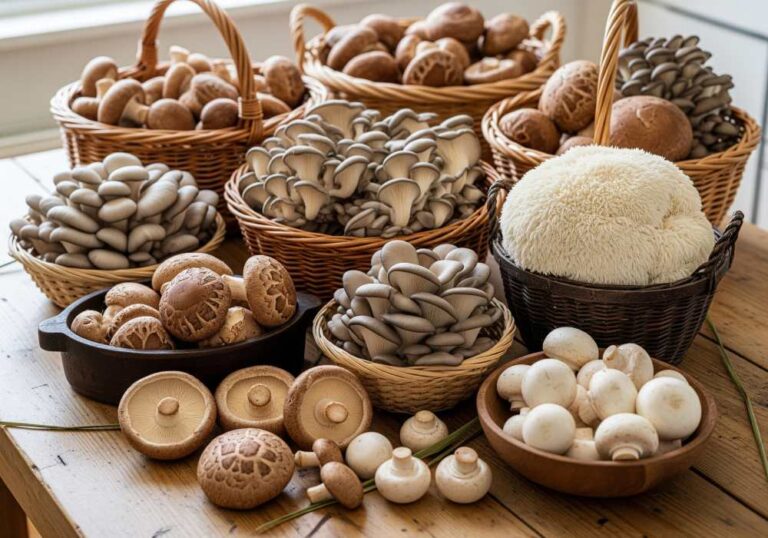For many new mothers, a cup of coffee feels like a lifeline during long, sleep-deprived days. But what if there was a healthier alternative that not only offers a smoother boost of energy?
The answer is mushroom coffee, a surprising blend of traditional coffee and functional mushrooms like lion’s mane, chaga, and reishi.
It’s more than just a caffeine fix; It effectively reduces stress, boosts immunity, and sustains energy..
But for breastfeeding mothers, every sip matters. What you consume can directly affect your baby. So, there is a lot of A lot of “ifs and buts” to the answer of this. Let’s find out.
Disclaimer: The information provided here is for general knowledge and does not constitute medical advice. Always consult with a healthcare professional before making dietary changes while breastfeeding.
What Are The Benefits of Mushroom Coffee for Breastfeeding Moms?
The nutritional profile of mushroom coffee can be appealing to breastfeeding moms. Functional mushrooms often contain beta-glucans, which help boost the immune system, and adaptogens, which are natural compounds that support stress management, hormonal balance which is also beneficial during menstruation. These can be valuable for nursing mothers dealing with sleepless nights and the physical demands of breastfeeding.

Unlike regular coffee, which may lead to energy spikes and crashes, mushroom coffee provides a steadier energy source. This can help moms stay active and alert throughout the day without the jittery feeling that comes with too much caffeine.
Another plus is its potential to support gut health. Functional mushrooms like chaga are rich in antioxidants, which can promote a healthy digestive system. A mom’s gut health can influence her overall health. The prolonged energy levels and lower caffeine content mean you don’t need to depend on snacks here and there, which increases the chances of getting fat.
Risks and Considerations While Breastfeeding
While mushroom coffee offers several potential benefits, breastfeeding moms must approach it carefully. Here’s what you should know before adding it to your diet:

1. Limited Research on Medicinal Mushrooms During Breastfeeding
The effects of functional mushrooms like reishi, chaga, or lion’s mane during breastfeeding haven’t been thoroughly studied. While these mushrooms are generally considered safe for adults, I completely understand your concerns about their impact on breast milk and your baby.
It’s important to remember that the effects of their bioactive compounds are still not fully understood.
Since some mushrooms may interact with our bodies in unexpected ways, it’s wise to approach this with caution for the sake of your little one. Your health and your baby’s well-being are what truly matter!
2. Possible Digestive Reactions
Certain mushrooms in mushroom coffee blends could cause mild digestive issues for some moms or babies, such as bloating, gas, or discomfort. Every baby reacts differently, and even small changes in a mom’s diet can sometimes influence a baby’s digestion.

3. Allergic Reactions
Although rare, mushrooms can trigger allergic reactions in some individuals. For nursing mothers, this risk extends to their babies, as allergens may pass into breast milk. If you or your baby have any history of food sensitivities, consult your healthcare provider before trying mushroom coffee.
4. Caffeine Content in Mushroom Coffee and Its Impact on Breast Milk
Although mushroom coffee contains less caffeine than regular coffee, it’s not caffeine-free. It’s important to consider its caffeine content, which can be transferred to a nursing baby through breast milk.

Caffeine can affect a nursing infant in several ways:
Increased fussiness and irritability: Caffeine can make babies more fussy and irritable.
Sleep disturbances: It can disrupt sleep patterns which poses difficulty falling or staying asleep.
Hyperactivity: Some babies may become more hyperactive after their mothers consume excessive caffeine.
While small amounts of caffeine are generally safe for breastfeeding mothers, excessive caffeine intake can have negative consequences for both the mother and the baby. The American Academy of Pediatrics (AAP) recommends that breastfeeding mothers limit their daily caffeine intake to 300 mg or less.

Remember that other sources of caffeine, such as tea, chocolate, and sodas, also contribute to your daily total.
5. Hidden Ingredients in Some Blends
Not all mushroom coffee products are made the same. When choosing products, it’s important to look for those that contain clean and safe ingredients.
Some brands may include additional herbs, artificial flavors, or sweeteners that may not be suitable for breastfeeding moms. Taking the time to read labels carefully can help ensure you’re making the best choices for your health and well-being.
6. Risk of Overconsumption
Medicinal mushrooms are potent, and consuming too much of them may lead to unintended effects. Stick to the recommended serving sizes on the product label and avoid overindulging, even if the coffee tastes mild.

Practical Tips for Breastfeeding Mothers Considering Mushroom Coffee
If you’re a breastfeeding mom curious about mushroom coffee, here are some simple and practical tips to help you enjoy it safely:
Start Small
Begin with half a serving or even less to see how your body and baby respond. This way, you can watch for any changes in your baby’s mood, sleep, or digestion without overwhelming their system.
Check the Ingredients
Not all mushroom coffees are the same. Some include extra herbs, sweeteners, or flavors that may not be suitable for breastfeeding moms. Look for products with clean, organic ingredients and avoid those with additives.

Time It Right
Drink your mushroom coffee after nursing or pumping. This timing can reduce the amount of any active compounds or caffeine that might transfer to your breast milk.
Stay Within Limits
Keep your caffeine intake in check. Mushroom coffee usually has less caffeine than regular coffee. However, it still adds up if you have tea, chocolate, or sodas.
Stay Hydrated
Breastfeeding moms need extra fluids to stay hydrated. While mushroom coffee is less dehydrating than regular coffee, drink plenty of water to maintain your hydration levels.

Watch Your Baby’s Reactions
Pay attention to your baby’s behavior after you’ve had mushroom coffee. If they seem fussier, have trouble sleeping, or show signs of an upset stomach, it might be time to cut back or stop drinking it.
Stick to Trusted Brands
Choose mushroom coffee from well-known, reputable brands that test their products for safety and purity. Look for labels that say “organic,” “third-party tested,” or “non-GMO” to ensure you’re getting the best quality.
Ask an Expert
Before adding mushroom coffee to your routine, talk to your doctor or a lactation consultant. They can provide advice tailored to your health and your baby’s needs.

Avoid Overdoing It
Even though mushroom coffee seems mild, too much of anything can be harmful. Stick to the recommended serving size on the package, and don’t use it as a replacement for a balanced diet.
Comparing Mushroom Coffee to Other Alternatives for Breastfeeding Moms
When breastfeeding, choosing the right beverage can feel like walking a tightrope. You want a boost of energy without compromising your baby’s health or milk supply.
Here’s how mushroom coffee stacks up against regular coffee, green tea, and herbal teas.
| Beverage | Caffeine Content | Benefits | Drawbacks | Best for Breastfeeding Moms? |
| Regular Coffee | High (80–120 mg/cup) | Strong energy boost, rich flavor | High caffeine, may affect baby | Consume in limited amounts |
| Green Tea | Moderate (30–50 mg/cup) | Antioxidants, gentle energy | Tannins may reduce iron absorption | Safe in moderation |
| Herbal Teas | None (0 mg) | Soothing, caffeine-free, hydrating | Some herbs may reduce milk supply | Great if ingredients are safe |
| Mushroom Coffee | Low (10–50 mg/cup) | Mild energy boost, wellness benefits | Taste can be an acquired preference | A balanced choice with lower caffeine |
Final verdict: Is it Safe for Breastfeeding Mothers?
Yes, but with caution. While mushroom coffee offers a unique flavor profile and potential health benefits, it’s important to consider its caffeine content and potential interactions with certain medications.








